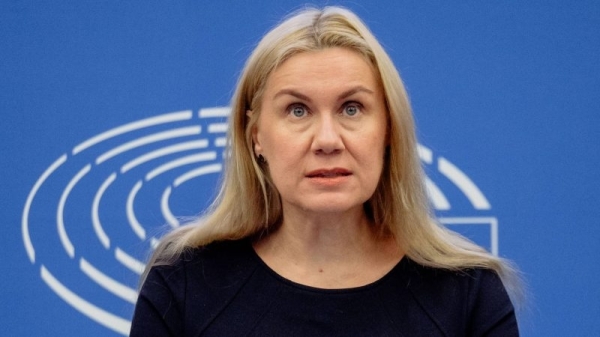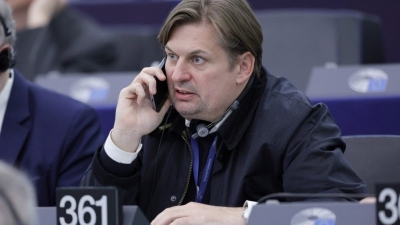EU unveils power market reform to tame volatile electricity prices

The European Commission published its proposal to reform the EU electricity market on Tuesday (14 March), focusing on countering volatile gas prices by providing consumers with more protection, boosting renewables and supporting demand-side measures.
“For over two decades, the electricity market design has served European companies and consumers well, letting them enjoy the benefits of a single market,” said EU energy chief Kadri Simson as she announced the proposal.
“However, the energy crisis spurred by Russia’s attack on Ukraine exposed a number of shortcomings in the current system, which needed to be addressed,” she told journalists.
The proposed reform seeks to accelerate the deployment of renewables, which need to triple before 2030 if the EU is to meet its clinate targets.
It also looks at reducing the impact of volatile fossil fuel prices on electricity bills and protecting consumers from future price spikes.
But the proposal will not change the fundamentals of the EU market, which will remain rooted in the current marginal pricing system where cheap renewables and nuclear power are called in first to meet consumer demand, Simson said.
“The design of short term markets remains the most efficient when it comes to ensuring that the cheapest and cleanest technologies are used first,” the EU’s energy commissioner said.
“The current design also guarantees that there will be trade between member states at moments of scarcity,” she added.
This was welcomed by the renewable energy industry, which had warned against radical reform.
“We’re glad to see that today’s proposal builds on the well-established foundation of the European electricity markets, without upheaving fundamental market principles,” said Naomi Chevillard, head of regulatory affairs at SolarPower Europe.
Giles Dickson, CEO of WindEurope, said: “The problem of Europe’s electricity market these last two years has not been the market design. It’s been high gas prices, made worse by the war.”

Seven EU countries call for cautious electricity market reform
A group of seven EU countries has called on the European Commission to keep its upcoming reform of the electricity market “targeted” and focused on measures that will enable the green transition while ensuring affordable energy for consumers.
Empowering consumers
The proposal includes measures enabling EU citizens to become more active players in the energy market, granting them a wider choice of contracts and clearer information.
Suppliers will be required to inform households about the “advantages and risks of different types of contracts,” according to a Commission official, who called this “a very important addition” to consumer protection.
In addition, consumers will be able to combine fixed and flexible pricing for electricity with several suppliers if they wish.
“A consumer may in the future have a fixed and a flexible contract at the same time – with one supplier or even two different suppliers,” explained a senior Commission official.
For instance, households may opt for a fixed price contract for their ordinary consumption – such as lights, TV, internet, etc. – and choose a flexible or dynamic contract for their heat pump or electric vehicle in order to benefit from low night prices, they added.
Consumers will also enjoy a new right to share energy within a community, for example by selling excess rooftop solar power to neighbours, a move described as “historic” by the industry.
“New proposals literally put the power in citizens’ hands. For the first time ever, we’ll have a legal framework to share electricity, complementing the energy communities’ framework,” said Chevillard.
Alongside this, the reform reinforces protection for small consumers.
For instance, EU countries will be able to intervene in times of crisis and set retail prices for households and small businesses, provided the limit is set below their average consumption in order to incentivise demand reduction.
Consumers will also be offered greater protection when energy suppliers go bankrupt, with EU countries obliged to designate a supplier of last resort and prevent vulnerable consumers from being disconnected.
Demand reduction and ‘peak shaving’
Another key aspect of the reform is making the market more adaptable to changes in supply and demand, helping to displace pricey gas and coal power during peak demand.
“The Commission plans to tackle high prices from gas power generation in the best way – by reducing its significance,” said Vilislava Ivanova, research manager for clean energy systems at climate think tank E3G.
One way to do this is by allowing power grid operators to use “peak shaving” products to incentivise energy savings when demand is highest, in order to keep prices down.
“The peak shaving product has the potential to stimulate flexibility from end-users,” commented Michael Villa, executive director at Smart Energy Europe, an industry association.
EU countries will also be required to define national objectives for demand-side response and storage in their updated National Energy and Climate Plans, a move hailed by Villa as “a major step forward to quantify, track and stimulate the activation of flexible demand”.
But while flexibility targets are broadly welcomed, they are not sufficient, Ivanova said.
“More action will be needed, especially by network operators, to ensure the EU takes advantage of 21st-century digital technologies and promotes consumer-focused innovation,” she commented.

What to expect from the EU’s power market revamp
In politics, sometimes there are telltale signs of where things are headed. Such is now the case for the EU’s upcoming electricity market reform, writes Frédéric Simon.
Long-term contracts
The Commission’s reform also seeks to reduce the exposure of industrial electricity consumers to volatile prices with measures to support long-term contracts for power supply and demand.
“The dominance of the short-term market has amplified the effects of the gas price rise and has been the source of various problems during the crisis,” Simson explained, saying the benefits of cheap renewable power was not sufficiently passed on to industrial consumers.
Long-term contracts includes power purchase agreements (PPAs) that create a stable power price for consumers and guaranteed revenue for producers. EU countries will be required to remove barriers to PPAs with market-based guarantees tackle risk.
Alongside this, any public support for new renewable or nuclear capacity will now have to be done via a two-way contract for difference (CfD), which will ensure guaranteed revenue for energy producers while shielding consumers against excessive price fluctuations.
This means that, when the market price is low, producers will be guaranteed revenues and, when the market price rises, excess profits will be channeled back to consumers.
“We are not proposing contracts for difference for any investments but for investments where public support is deemed necessary,” a senior Commission official explained, saying this will also apply to repowering projects or the lifetime extension of nuclear power plants.
The move was welcomed by Eurelectric, the European electricity industry association.
“Long-term instruments are the key element in this reform as they provide benefits for both customers and investors,” said Kristian Ruby, the secretary general of Eurelectric.
“Access to fixed-price offerings allow customers to limit their exposure to extreme price volatility. At the same time, long-term signals will give investors better visibility on their cash flows,” he added.
Crucially, the proposal does not impose PPAs or CfDs but lets EU countries decide which solution to choose depending on their national circumstances. It is a less radical approach than the mandatory contracts for difference proposed by some EU countries that raised heckles in the renewables industry.
“We’re particularly grateful to have avoided CfDs as the only route to market for new solar, or retroactive CfDs on existing solar projects. Investors can trust that the terms of their investments won’t suddenly change,” said Chevillard.
Brussels aiming for swift adoption
The European Parliament and EU countries will now examine the proposal with the objective of reaching agreement in the autumn.
“We would certainly hope that the co-legislators would come to an agreement rapidly, ideally before next winter” so that the measures are already in place for the next heating season, the Commission official said.
This could put EU countries at odds, with Paris pushing for a swift review and Berlin preferring to delay the overhaul until after the European elections in Spring 2024.

Electricity market reform: Paris challenges Berlin on the timetable
Paris wants the EU’s electricity market reform completed by the end of the year, the French energy minister’s office said on Friday (24 February), challenging Berlin’s preference to wait until the 2024 European elections.



